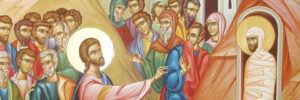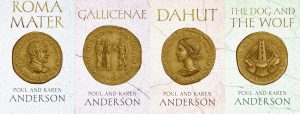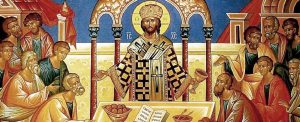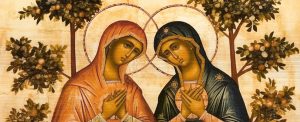Today at Christ’s triumphal entry into Jerusalem, we heard and sang many times lines from Psalm 117 (118 KJV):
“Open unto me the gates of righteousness; I will enter therein and give thanks unto the Lord… The stone which the builders rejected is become the head of the corner. This is the Lord’s doing, and it is marvelous in our eyes… O Lord, save now [Heb: hosanna]; O Lord, send now prosperity. Blessed is he that cometh in the name of the Lord. (v. 19, 22,23, 25).
Together with prophecies such as:
“Therefore thus saith the Lord God, Behold, I lay in Sion for a foundation; a stone: a tried stone, a precious cornerstone, a sure foundation; he that believeth shall not be alarmed.” (Isaiah 28:16).
“Rejoice greatly, O daughter of Sion; shout, O daughter of Jerusalem: behold, thy King cometh unto thee: he is righteous, and having salvation; lowly, and riding upon an ass, and upon a colt the foal of a donkey” (Zechariah 9:9).
In Luke 20:17-18 (but you should read the whole twentieth chapter to understand why the Jews were so furious on this day!) Christ quotes the Psalm, saying:
“What then is this that is written: ‘The stone which the builders rejected has become the chief cornerstone’? Whoever falls on that stone will be broken; but on whomever it falls, it will grind him to powder.”
The Lord (presumably speaking in Aramaic) engages in wordplay in his segue from a parable of a judgment regarding a stone (‘eben) to teaching that he is David’s Lord and Son (ben) in v.40-41. Christ is calling himself the rejected but judging stone, joining together the rejected stone in Psalm 118:22, the stumbling stone from Isaiah 8:14-15, and the crushing stone of Daniel 2:34-35;44-45.
His comment on Psalm 117:22, “The stone which the builders rejected has become the chief cornerstone… whoever falls on that stone will be broken, but on whomever it falls, it will grind him to powder,” is reminiscent of the midrash Esther 3:6 Rabbah (a Hebrew Bible commentary): “Should the stone fall on the clay jar, woe to the clay jar. Should the clay jar fall on the stone, woe to the clay jar.”
His use of Psalm 117 is significant to us, knowing as we do that soon after this sermon, Christ will enter Jerusalem as a mounted King, hailed with messianic hosanna verses from this Psalm – and then he will be rejected by his people.
On this day, Christ our God is not only the Master and Source of scripture, but he is a man who has read, sung, and obeyed it all his life, Christ sees scriptural connections and themes that the Jewish scribal tradition still had not perceived after a thousand years of study. One can begin to sympathize with the elders and scribes in the temple who found themselves discussing the deep things of God for hours with a thirteen-year-old boy (Luke 2:41–52), and with the soldiers who listened to Christ’s preaching and returned without arresting him, saying, “Never man spake like this!” (John 7:47).






